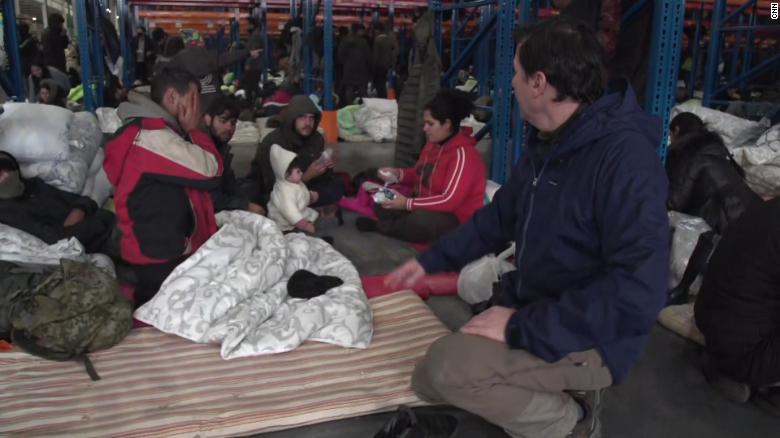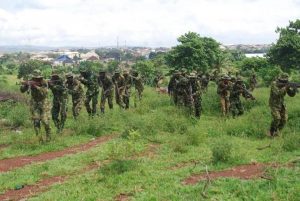They gave up everything to get to Europe. Now they may be sent home

Hundreds of desperate and increasingly frustrated migrants stranded at the CNN spoke with two brothers from Afghanistan, age 20 and 21, who walked by foot for days through forests in Belarus and across the border into eastern Poland, where they said they were met by a smuggler that drove them into Warsaw. But soon after arriving in the capital, they were arrested by police.The brothers were being treated in a hospital in eastern Poland for hypothermia. They say they’re desperate to join their uncle in Germany, but aren’t sure whether they’ll be allowed by Polish authorities to continue their journey. “When the government changed [and the] Taliban took control of Afghanistan, everyone left their jobs and my parents are not working at the moment, there is no money, no food … I can’t get education, it’s been a long time that schools and universities are closed,” one of the brothers said. “That’s why I want to go to Germany.”The brothers were taken away from the hospital by Polish police after CNN left. It’s not clear where they were taken.Poland is under fire by international aid organizations who say they are violating international law by pushing asylum seekers back into Belarus, instead of accepting their applications for international protection. Poland stands by its actions, saying they are legal.Authorities on the other side of the border in Belarus told CNN on Wednesday they were waiting to hear from officials in Munich about a possible “humanitarian corridor” to ferry migrants into the country. President Alexander Lukashenko on Monday offered to fly them to the German capital on its state-run airline if Poland refused to open its border. But that option looks incredibly unlikely. German Foreign Minister Heiko Mass said Monday evening Germany would not take in the migrants, and that the European Union’s plan was for them to go back home.In their second phone call in almost as many days, German Chancellor Angela Merkel spoke with Lukashenko on Wednesday to underline the need to ensure humanitarian care and return opportunities for the people affected, with the support of the UN and in cooperation with the EU Commission.Earlier on Wednesday, European Commission President Ursula von der Leyen said the commission would be mobilizing €700,000 (about $791,000) to deliver food, blankets, hygiene and first aid kits to refugees at the Belarusian border. “We are ready to do more. But the Belarusian regime must stop luring people and putting their lives at risk,” von der Leyen said.The EU has blamed Belarus for manufacturing the crisis on the bloc’s eastern border, alleging that the government has opened the flood gates to people desperate to flee a region beleaguered by unemployment and instability. EU officials have called it a “hybrid war,” which they say is designed to punish Poland for taking in the president’s political opponents and pressure the bloc into lifting sanctions on Belarus. But it has had the opposite effect. On Monday, Europe said it would slap new sanctions on Belarus targeting “everyone involved” in exacerbating the border crisis. EU foreign affairs chief Josep Borrell announced at a press conference in Brussels that the new sanctions on “people, airlines, travel agencies and everyone involved in this illegal push of migrants against our borders” would be confirmed in the coming days.It will be the fifth round of sanctions on Belarus by the EU following a disputed presidential election and crackdown on dissidents.Lukashenko’s government has repeatedly denied such claims, instead blaming the West for the crossings and accusing it of poor treatment of migrants.To back up its version of the crisis, Minsk has allowed CNN and other international media outlets to visit the border and report on the scenes of migrants camped out there. Many have been staying in flimsy tents, with temperatures dropping well below freezing at night. Warsaw, meanwhile, has tried to keep the crisis from view, blocking the Polish side of the border to journalists, aid workers and doctors amid an extended state of emergency.On Wednesday, CNN spoke with families who had sought shelter in the warehouse about a kilometer from the border, which normally houses cargo. Sprawled out on blankets and sleeping bags, their belongings heaped in piles around them, they were relieved to get out of the cold but worried about their future and bruised by the ordeal, which has seen some spend thousands on Belarusian visas and flights to Minsk.Many of the migrants say they traveled to Belarus in search of employment opportunities, medical care for family members, and a more stable life in Europe. Twenty-eight-year-old mother Shoxan Bapir Hussain, her husband and four-year-old son, Azhi Ali Xder, were among them. CNN first met the family a few days before in the freezing border camp. Hussain said the warehouse was better, warmer. “We have food, we have [a] bed,” she said.Hussain’s family embarked on the journey from Iraqi Kurdistan because of her son, whom she said needs surgery for a back condition. Azhi, who has splints on his legs, can’t walk. It’s those hopes and dreams that have kept people here in spite of the conditions.”I wish to go to Germany … I think Germany has humanity,” Hussain said.Matthew Chance and Zahra Ullah reported from Belarus, while Antonia Mortensen reported from Poland. Eliza Mackintosh wrote and reported from London. Magda Chodownik, Kung Kaminski, Fred Pleitgen and Stephanie Halasz contributed to this report.







